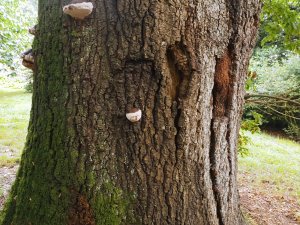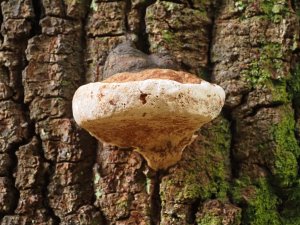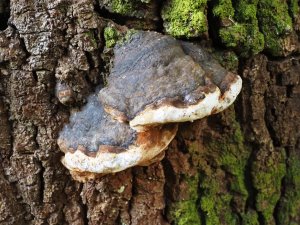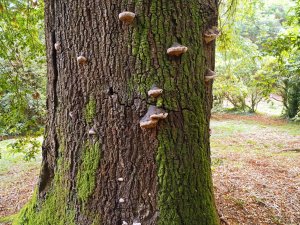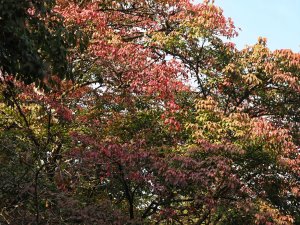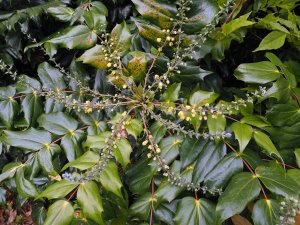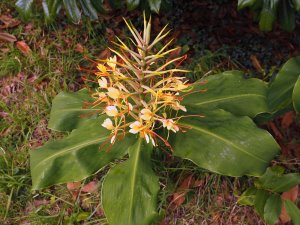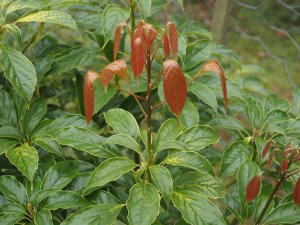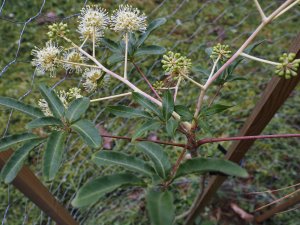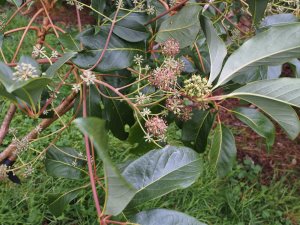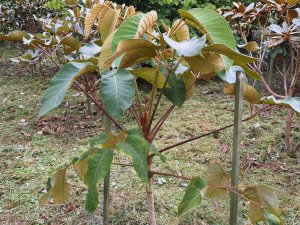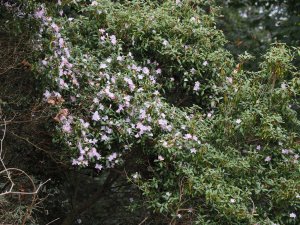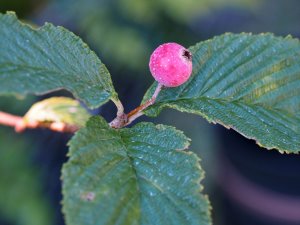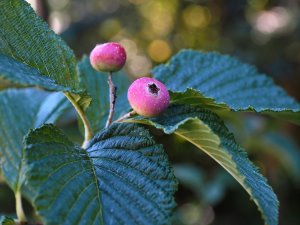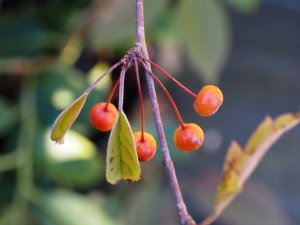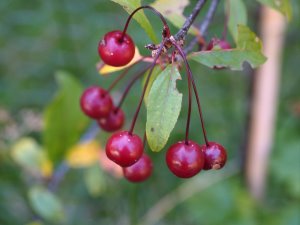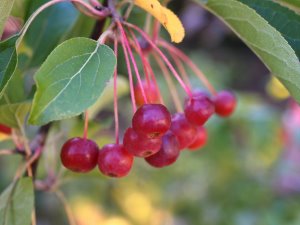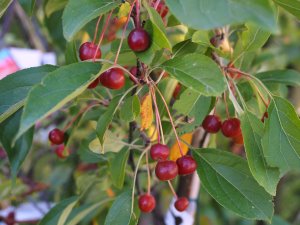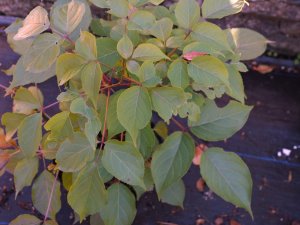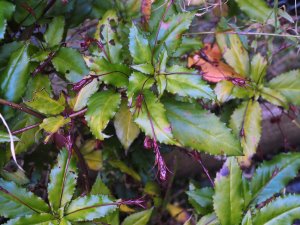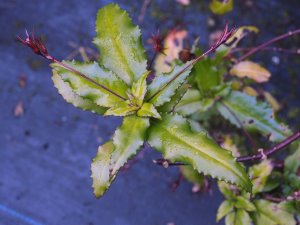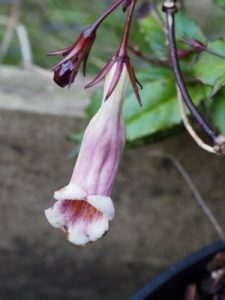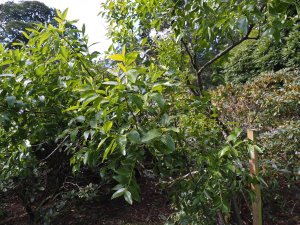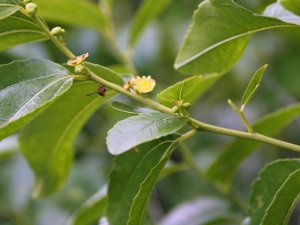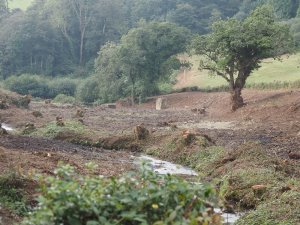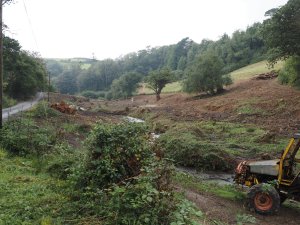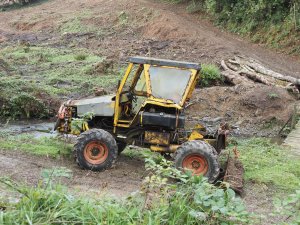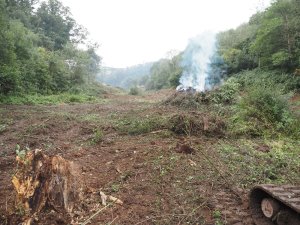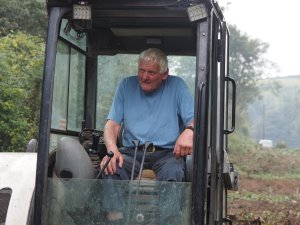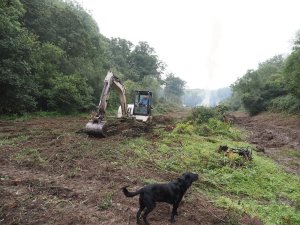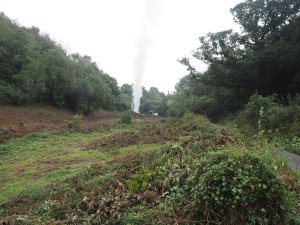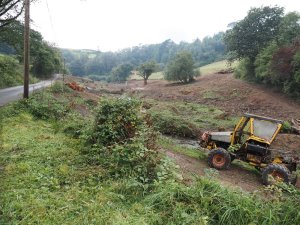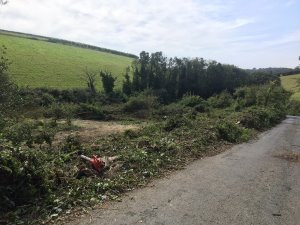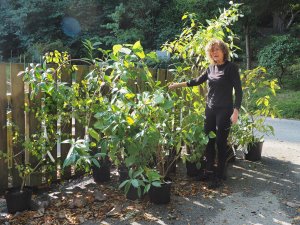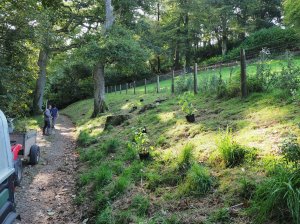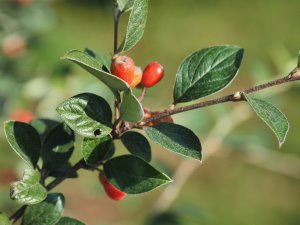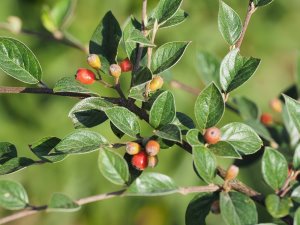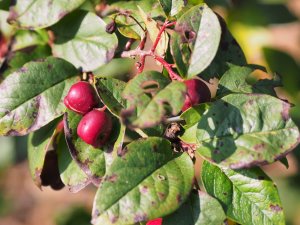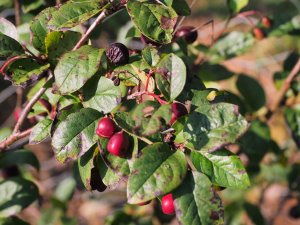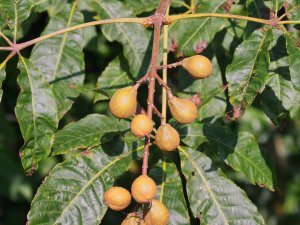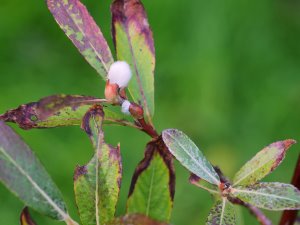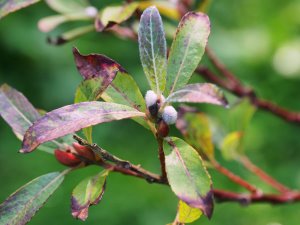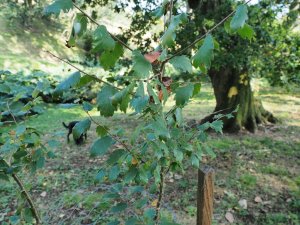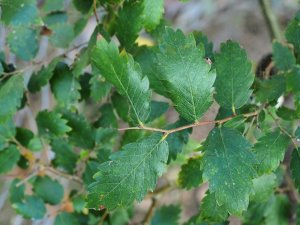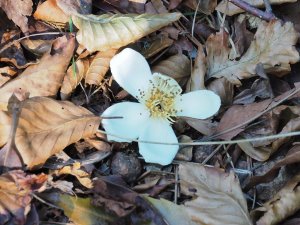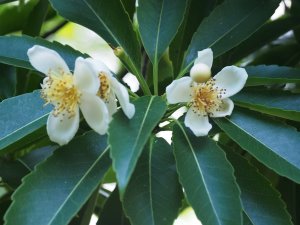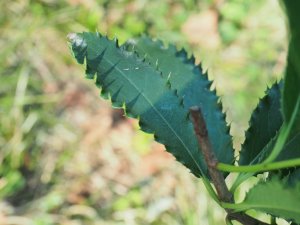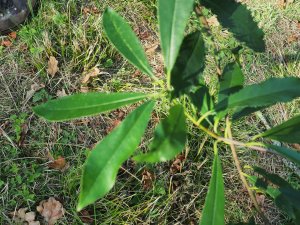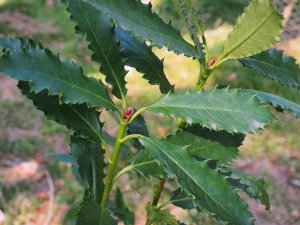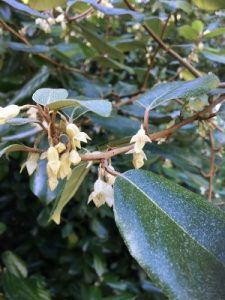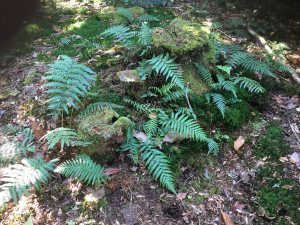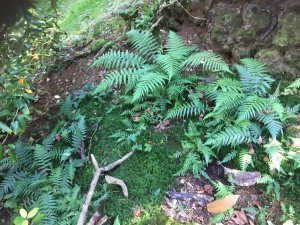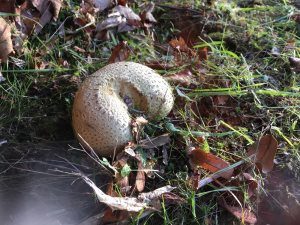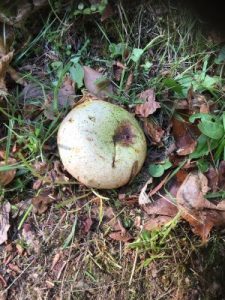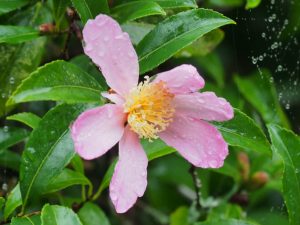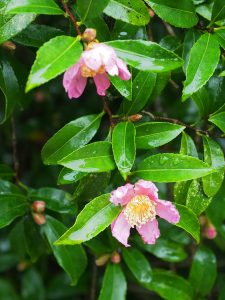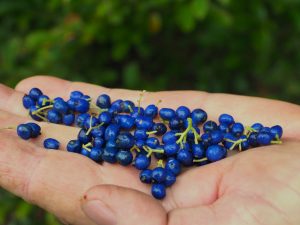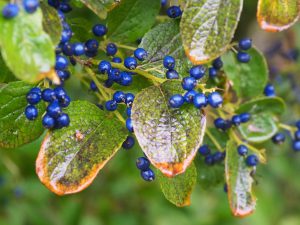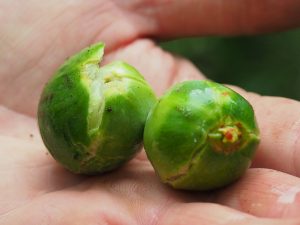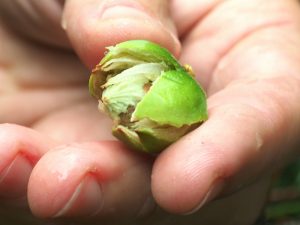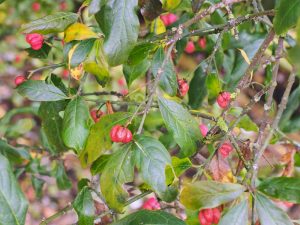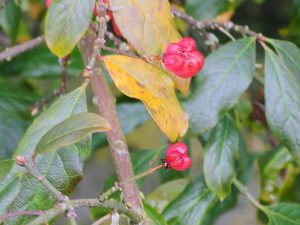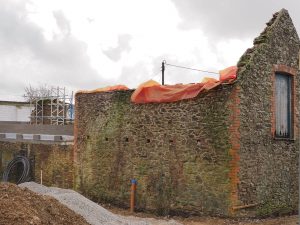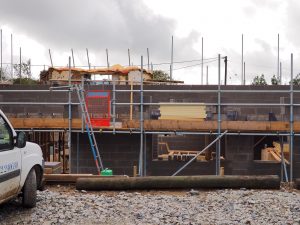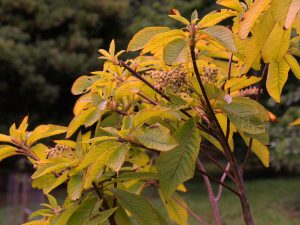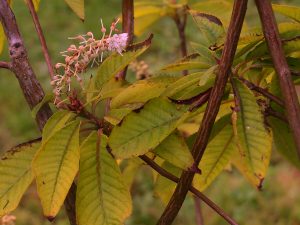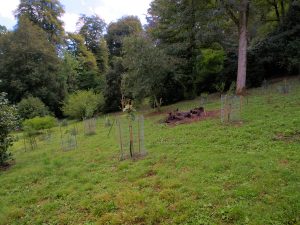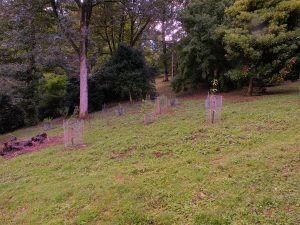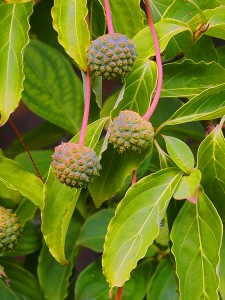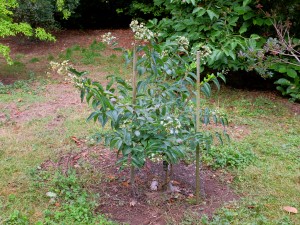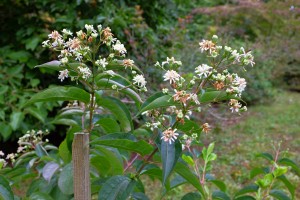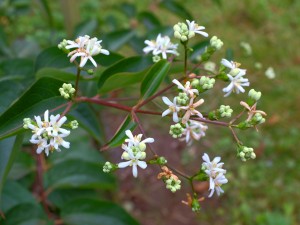2024 – CHW
Not a house martin to be seen from the roof today in balmy weather still. Now just the house martin droppings to brush up and stop them blocking any culverts through the roof over the winter.
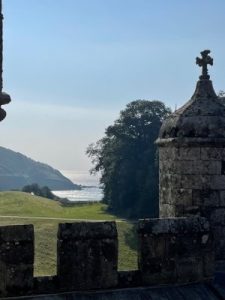
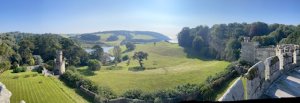
The trunk of the Turkey oak which is about to be felled in the Aucklandii Garden. The crown looks fine but the base does not. Bleeding cankers for several previous years but now saddle fungi, bark split and obvious Phytophthora infections as well as honey fungus. We think 120 years old but will soon be able to count the rings.
Acer henryi looking very autumnal already.
Mahonia japonica out on the bank even earlier than usual. The reference books say ‘early autumn’!
The label for this Hedychium seems to have vanished.
2023 – CHW
Interesting secondary new growth on Meliosma sp. TH5092 from North Vietnam.
First flowers on a young Schefflera aff. enneaphylla (HWJ844).
Schefflera pauciflora (WWJ 1199) with flower and seeds.
A replacement Schefflera macrophylla getting going now. Will the deer leave the leaves alone?
One plant in a large group of Rhododendron davidsonianum has decided to put on a show of secondary flowers. No sign of a flower on any other plant of this species that I can see today. Not a good sign I fear for the one flowering.
2022 – CHW
To the greenhouse to sort out piles of plants for different areas to plant out in the next few weeks.
Eucryphia lucida x cordifolia still has a few tail end flowers out.
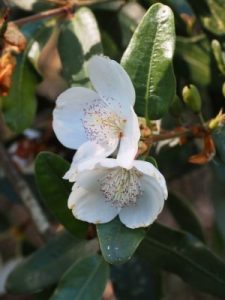
Sorbus needhami with fruits even though still in pots.
First fruits on a pot grown Malus toringo.
Also on Malus ‘Prairie Fire’ – this is going to be a wonderful tree in the Kitchen Garden.
I was expecting real crab apples on Malus baccata but, when I look it up, the fruits are exactly like this. Most attractive as well.
Bischofia polycarpa as grown away well in the frame and doubled in size since April.
Lysionotus aff. kuangensis (HWJ 625) is an extraordinary thing which I must have bought from Crug Farm without having any idea what it was. Looks tenderish and perhaps a rockery plant? When I look it up it does need a frost free greenhouse and it is a creeping plant from the Himalayas. Rather large drooping flowers from equally odd, reddish buds in an odd formation. Clearly it flowers progressively over a long period. We have just the damp place in the Rockery for this next spring.
Ziziphus jujuba struggles here and has only grown to around 10 feet in the 35 years. My brother lighting a fire too close to it many years ago didn’t help. It should be producing edible fruit now but all I see is a few tiny yellow flowers. It needs Mediterranean warmth as it is very late to come into leaf each season. On reflection it has done better this year in the drought.
2021 – CHW
More pictures of Ross and his clearance of the valley / river bottoms under Manassick, Sentries and Parnalls Hill. Posterity may enjoy how it looks today.
More pictures of Ross and his clearance of the valley / river bottoms under Manassick, Sentries and Parnalls Hill. Posterity may enjoy how it looks today.
During a recent wildflower survey Salix triandra was identified here. I fear it is no more in this particular location but seed will probably germinate. This is the almond-leaved willow which is a UK native tree cultivated for basket making. The ‘withy moor’ further up the valley also has this species.
2020 – CHW
Dead elms removed from the roadside below Rescassa as requested by the county council.
Dead elms removed from the roadside below Rescassa as requested by the county council.
Asia labelling up 32 new plants from Crûg Farm.
The list of arrivals:
Daphniphyllum paxianum BSWJ9755
Escallonia myrtilloides BSWJ14329
Hydrangea angustipetala f. macrosepala CWJ 12441 x 3
Hydrangea aspera kawakamii Formosa BSWJ7025 x 3
Hydrangea heteromalla from Vietnam HWJ938
Hydrangea hirta?
Hydrangea longipes v. fulvescens BWJ8188 x 3
Hydrangea serrata Crug Cobalt BSWJ6241a x 3
Ilex gagnepainiana FMWJ 13168
Lindera neesiana BSWJ13983
Oreopanax mutisianus BSWJ14912
Oreopanax sectifolius BSWJ14355
Parastyrax sp. nova BWJ15185
Paulownia taiwaniana BSWJ7134
Photinia serratifolia v. ardisifolia NMWJ14513
Rhodoleia aff. Henry (DJHV0640 or BSWJ11782-two labels on a plant)
Rhodoleia parvipetala FMWJ13422
Schefflera gracilis HWJ622
Stachyurus macrocarpus BSWJ14678
Staphylea bumalda BSWJ11053
Strobilanthes flexicaulis BSWJ354
Strobilanthes wallichii
Ternstroemia gymnanthera BSWJ12948
Ternstroemia aff. chapaensis WWJ11918
Viburnum parvifolium BSWJ6768
x Didrangea Ytiensis BSWJ11790Also the list of plants bought from Nick Lock:
Berberis hypokerina
Buddleja tibetica
Cotoneaster affinis
Euonymus wilsonii
Frangula alnus ‘Aspleniifolia’
Pomaderris elliptica
Viburnum fordiae
Viburnum phlebotrichum
Viburnum taiwanianum
Viburnum wilsoniiTom gave us a Deutzia longifolia.The pile of plants to go out into Old Park today.Philadelphus and deutzia species go out on the bank below White Styles field. This will cheer up the visitor route to Old Park later in the year.
Daphniphyllum paxianum BSWJ9755
Escallonia myrtilloides BSWJ14329
Hydrangea angustipetala f. macrosepala CWJ 12441 x 3
Hydrangea aspera kawakamii Formosa BSWJ7025 x 3
Hydrangea heteromalla from Vietnam HWJ938
Hydrangea hirta?
Hydrangea longipes v. fulvescens BWJ8188 x 3
Hydrangea serrata Crug Cobalt BSWJ6241a x 3
Ilex gagnepainiana FMWJ 13168
Lindera neesiana BSWJ13983
Oreopanax mutisianus BSWJ14912
Oreopanax sectifolius BSWJ14355
Parastyrax sp. nova BWJ15185
Paulownia taiwaniana BSWJ7134
Photinia serratifolia v. ardisifolia NMWJ14513
Rhodoleia aff. Henry (DJHV0640 or BSWJ11782-two labels on a plant)
Rhodoleia parvipetala FMWJ13422
Schefflera gracilis HWJ622
Stachyurus macrocarpus BSWJ14678
Staphylea bumalda BSWJ11053
Strobilanthes flexicaulis BSWJ354
Strobilanthes wallichii
Ternstroemia gymnanthera BSWJ12948
Ternstroemia aff. chapaensis WWJ11918
Viburnum parvifolium BSWJ6768
x Didrangea Ytiensis BSWJ11790Also the list of plants bought from Nick Lock:
Berberis hypokerina
Buddleja tibetica
Cotoneaster affinis
Euonymus wilsonii
Frangula alnus ‘Aspleniifolia’
Pomaderris elliptica
Viburnum fordiae
Viburnum phlebotrichum
Viburnum taiwanianum
Viburnum wilsoniiTom gave us a Deutzia longifolia.The pile of plants to go out into Old Park today.Philadelphus and deutzia species go out on the bank below White Styles field. This will cheer up the visitor route to Old Park later in the year.
Plenty of berries on Cotoneaster noujanensis which was planted a year ago.
Also red then black berries on Cotoneaster wilsonii planted at the same time. None of the other 15 or so new species have any obvious berries as yet but none have died.
Aesculus wilsonii laden with conkers again this year. Last year’s crop germinated well.
Salix gracilistyla ‘Mount Aso’ with its new buds showing already. This is a male form which will have silky pinkish-red catkins. Planted by the old dog kennels.
Zelkova sicula curana has established well in its first year. A rare shrubby species with ovate serrated leaves.
Schima superba is flowering rather better this year than last. Some flowers already on the ground. Tom said yesterday that his Schima species were performing well but ours are having a second year off.
Photinia serratifolia x ardisifolia from Crûg has growth with some leaves heavily serrated/prickled and some totally un-prickled and un-serrated.
2019 – CHW
One always forgets that Elaeagnus x ebbingei flowers in the autumn and produces orange seeds in the spring. There is a big clump above the fernery flowering away nicely at present. The flowers are very fragrant.
One always forgets that Elaeagnus x ebbingei flowers in the autumn and produces orange seeds in the spring. There is a big clump above the fernery flowering away nicely at present. The flowers are very fragrant.
A fine array of Dicksonia antarctica seedlings are coming up here and there in dark shady wet places around the fernery.
Yet more unusual fungi which may or may not be edible?
2018 – CHW
A morning gathering seeds and evergreen cuttings here this Monday for propagation for the nursery by a third party specialist propagator. We cannot grow everything ourselves and many rarities are so difficult to propagate that it is best to have more than one person trying. The add-on benefit is that we may get new replacement plants for some of our aging rarities. Perhaps the most important thing overall! Fifty separate sets of seeds and cuttings were gathered by four of us in three hours with a careful route plan.The first ancient single pale pink Camellia sasanqua has sprung open in a bit of drizzle. I looked only two days ago. About three weeks earlier than last year but about on par with the norm over 20 years. The other old sasanquas are a bit later especially the smaller flowered darker pink one. The camellia season is starting all over again. Marvellous!
A morning gathering seeds and evergreen cuttings here this Monday for propagation for the nursery by a third party specialist propagator. We cannot grow everything ourselves and many rarities are so difficult to propagate that it is best to have more than one person trying. The add-on benefit is that we may get new replacement plants for some of our aging rarities. Perhaps the most important thing overall! Fifty separate sets of seeds and cuttings were gathered by four of us in three hours with a careful route plan.The first ancient single pale pink Camellia sasanqua has sprung open in a bit of drizzle. I looked only two days ago. About three weeks earlier than last year but about on par with the norm over 20 years. The other old sasanquas are a bit later especially the smaller flowered darker pink one. The camellia season is starting all over again. Marvellous!
The big find today was Symplocus paniculata simply plastered in blue berries. Last year there were only a few here and there. The drought has brought its own benefits in the seed production of plants which like a hot dry summer.
We go on to take cuttings of three separate species of Torreya. We saw two species with green fruits a couple of weeks ago. Today Torreya grandis’ fruits are still green but they are splitting and most were collected from the ground. A single seed in each green capsule with lots of sticky pith around it which has an odd smell.
2017 – CHW
You do not very often see Euonymus japonicus growing in Cornish hedgerows but here a bush full of seed pods which are turning red nicely but no colour on the leaves yet.
You do not very often see Euonymus japonicus growing in Cornish hedgerows but here a bush full of seed pods which are turning red nicely but no colour on the leaves yet.
The Newton barn conversions are starting to take shape and are rising again out of the ground. One is an almost total rebuild but we have managed to retain two walls on the second.
2016 – CHW
We have all missed the first flowering at Caerhays of another new clethra species. Clethra monostachya has leaves similar to Clethra delavayi but a different growth habit or so it appears so far.
We have all missed the first flowering at Caerhays of another new clethra species. Clethra monostachya has leaves similar to Clethra delavayi but a different growth habit or so it appears so far.
The March 2016 new planting above the Auklandii Garden where we ripped out the laurel hedge looks well with, as yet, no obvious casualties.
2015 – CHW
Cornus kousa ‘Gloria Birkett’ had the best and largest red fruits on any cornus in the garden last year. They are hanging in profusion and swelling but not turning red just yet. I wonder why this exceptional variety is not more widely available?
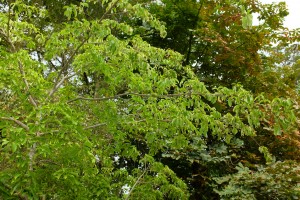
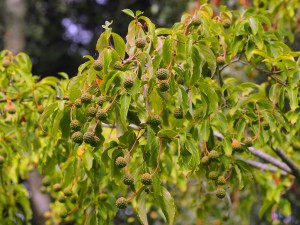
Beside it I find a young plant of Heptacodium micinoides in full flower. A strange plant with nicely peeling bark that can achieve a height of eight to ten feet but does not seem to live more than 20 years. Two others have died recently. It makes a nice aftermath to the hydrangeas. One would guess it was Chilean but it is actually Chinese although it only came to the UK in 1980. A plant which Burncoose could do a lot more to promote as something different.




